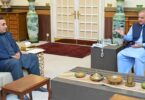F.P. Report
ISLAMABAD: Prime Minister Imran Khan and Tajik President Emomali Rahmon Wednesday expressed satisfaction over the excellent bilateral cooperation at the multilateral fora and reiterated their commitment to further strengthen multilateral cooperation in the future for global and regional peace, and development.
A joint declaration between the two countries enlisting ‘next steps in building strategic partnership for regional solidarity and integration, said the two leaders noted with appreciation the progress achieved in the implementation of the flagship power project of CASA-1000 and reiterated their resolve to complete the project at the earliest.
They agreed that the materialization of the project would establish energy connectivity leading to prosperity for all.
They emphasized the need to tap the vast potential that remained unexplored, particularly in the areas of trade, energy, connectivity, agriculture and industry for the mutual benefit, PM Office Media Wing said in a press release.
They underscored the importance of road, rail and air links between the two countries for promotion of bilateral as well as regional connectivity, and resolved to improve the existing facilities and explore new options for improving rail, road and air connectivity.
On the invitation of prime minister, President of Tajikistan Emomali Rahmon, accompanied by a high-level delegation, is on a two-day official visit to Pakistan.
The two leaders exchanged views on regional and global issues, and urged the international community to play its active role and help peacefully resolve all the outstanding disputes around the world in line with the United Nations Security Council resolutions and the principles of international law.
During their meeting, the prime minister reiterated Pakistan’s support to Tajikistan’s membership in the Quadrilateral Traffic-in-Transit Agreement (QTTA).
He informed the Tajik president about operationalization of Gwadar Seaport and offered Tajikistan to avail the facility of Pakistani ports and China Pakistan Economic Corridor (CPEC).
The prime minister highlighted that the Pakistani seaports offered the most efficient and economic route to the Central Asian countries, including Tajikistan.
In that regard, the Tajik president offered to convene a joint working group to address issues of transit trade at the earliest, and invite Afghanistan to participate in its meeting to boost trade and commerce with the view to engage broader region in the process.
During bilateral meetings, the two leaders held in-depth and wide-ranging discussions covering all aspects of bilateral cooperation, and regional and international issues of mutual interest.
Both the leaders reaffirmed the fraternal ties existing between the two countries marked by shared faith, history, culture and geography.
Expressing satisfaction at the steadily growing relations between Pakistan and Tajikistan, the two leaders expressed their resolve to elevate bilateral ties to a new level of strategic cooperation for the mutual benefit of the two countries and peoples.
They exchanged views on the rise of Islamophobia world-wide, and expressed support for the joint initiatives and collective efforts of the OIC to combat the scourge, including through the designation of March 15 as International Day to combat Islamophobia by the UN General Assembly.
Both the leaders had an in-depth discussion on security situation in Afghanistan and the ongoing peace process.
The Tajik president appreciated Pakistan’s role in facilitating the Afghan peace process. The two sides emphasized on an Afghan-owned and Afghan-led resolution of the conflict through an inclusive negotiated political settlement.
The two leaders emphasized enhanced cooperation in education, culture and tourism through mutual development and joint ventures, and highlighted the need to facilitate people-to-people contacts.
They noted with pleasure the growing bilateral cooperation in the field of defence and security, and reiterated their resolve to further boost the same in order to overcome the common security challenges faced by the two countries and the region as a whole.
They emphasized the need to enhance cooperation in counter-terrorism, combating cross-border organized crime and human and drug trafficking, and agreed to hold the next meeting of Joint Working Group on Countering International Terrorism at an early date.
The leaders extended felicitations to each other on the 30th anniversary of establishment of diplomatic relations between the two brotherly countries.
Pakistan was among the first countries to recognize independence of the Republic of Tajikistan in 1991.
The prime minister also congratulated the Tajik president on assuming the current chairmanship of the Shanghai Cooperation Organization (SCO) and Collective Security Treaty Organization (CSTO).
The leaders expressed serious concern at the outbreak of third wave of Covid-19 pandemic around the world that has resulted in the loss of many precious lives and caused huge economic losses, especially for developing countries.
To effectively combat the pandemic, they emphasized the importance of international solidarity and cooperation as well as joint efforts for affordable and equitable supply and distribution of vaccine to all the countries in coordination with the World Health Organization (WHO).
During high-level talks, the two sides accorded particular focus to bolstering bilateral economic and trade ties by exploring new opportunities and avenues, particularly in the backdrop of Tajikistan’s National Development Strategy (NDS) – 2030 and Pakistan’s development priorities shifting from geo-politics to geo-economics.
The two leaders underscored the importance of regularly convening the meetings of Pakistan-Tajikistan Joint Commission on Trade, Economic and Scientific-Technical Cooperation to further strengthen bilateral trade and economic ties.
They emphasized the need for full implementation and regular follow-up to its decisions. It was agreed to hold the next session of the Inter-Governmental Commission later this year.
The two leaders noted with satisfaction the activities of multiple Joint Working Groups (JWGs) constituted to further boost the already growing bilateral cooperation in various fields, particularly trade, investment, transport, energy, culture and tourism.
They highlighted the role of the Joint Business Council (JBC) constituted between the two countries in building direct business linkages, and urged to hold its meetings regularly by the chambers of commerce and private sectors.
They also agreed to organize trade exhibitions and business forums on regular basis with a view to boosting bilateral trade. They recognized the need for creating more investor-friendly environment in the two countries in particular to encourage and facilitate joint investments.
Recalling the signing of two joint declarations entitled (i) Joint Declaration on “Road to Strategic Partnership for Regional Solidarity”; and (ii) Joint Declaration on “Strengthening the Road to Strategic Partnership for Regional Integration”, adopted at the leadership level in 2017 and 2018 respectively, the two leaders agreed to initiate steps towards formalizing the strategic partnership agreement between the two countries for the peace, progress and prosperity at the earliest.
They expressed satisfaction at the existing inter-parliamentary cooperation and agreed to have regular exchanges of parliamentary delegations for further deepening bilateral ties.
The Tajik side appreciated Pakistan’s immense contribution to the global efforts against terrorism. Both the leaders vowed to further deepen mutual cooperation in the common fight against terrorism and extremism.
The Tajik side also lauded Pakistan’s continued humanitarian, material and technical support for Tajikistan’s development and progress. The Tajik president appreciated the excellence and expertise of Pakistani institutions in the field of learning and training of professionals in various fields.
The two leaders also discussed the adverse effects of climate change, and environmental challenges in the region, and agreed to step-up efforts and adopt joint measures.
The prime minister recognized the role of Tajikistan in the field of water diplomacy by hosting international moots in recent years to draw the attention of the international community towards better management of the water resources.






